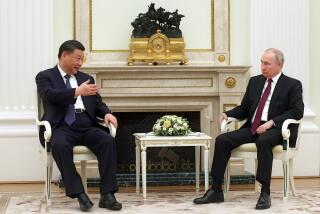Chinese Leader Lauds Soviets, Sees Closer Ties
- Share via
MOSCOW — China’s hard-line Communist Party leader bestowed a “socialist blessing” on the Soviet Union’s perestroika reforms Friday and said he intends to restore the close Chinese-Soviet cooperation of the 1950s.
Jiang Zemin, the first Chinese party chief to visit Moscow since 1957, attempted to lay to rest reports that Chinese leaders view President Mikhail S. Gorbachev’s policies as a betrayal of Marxism-Leninism.
“China and the Soviet Union are two great, friendly, neighboring countries,” a smiling Jiang told a Moscow news conference after three days of talks with Gorbachev and other top Soviet officials.
Jiang travels to Leningrad today for the final day of his four-day visit, which has been a largely symbolic celebration of the steady improvement in Chinese-Soviet relations started by Gorbachev when he went to Beijing two years ago.
Friday morning, Jiang visited a Moscow automobile factory where he worked as a trainee in the 1950s. Quoting a Chinese proverb, he said: “Meeting old friends brings extreme happiness.”
The world’s two largest Communist countries were close allies in the 1950s but split in the 1960s over a border dispute and rivalry for leadership of the international Communist movement.
Thursday, Chinese Foreign Minister Qian Qichen and his Soviet counterpart, Alexander A. Bessmertnykh, signed an agreement settling some, but not all, of the disputed sections of their 4,300-mile border.
About 90% of the border has now been agreed upon, Wu Qianmin, chief spokesman for China’s Foreign Ministry, said Friday. He said the areas still in dispute include islands in the Amur River over which Chinese and Soviet soldiers skirmished in 1969.
Answering reporters’ questions, Jiang said that during the three days of talks, no Soviet official raised the subject of China’s 1989 crackdown on pro-democracy protesters in Tian An Men Square.
He skirted a question about whether arms sales were discussed, saying only that “military exchanges” were “proceeding normally.” Western diplomats said earlier this week that they believe a sale of Soviet fighter jets to China is in the works.
Jiang also declined to give a personal assessment of the success of Gorbachev’s reforms, saying that three days is not enough to learn how perestroika is faring.
Jiang appeared relaxed throughout most of the hourlong news conference but bristled at a question about whether he had consulted with China’s aging former leader, Deng Xiaoping, before the trip.
“I would like to say for the sake of clarification that comrade Deng Xiaoping quit his post two years ago,” he said.
Soviet experts on China said this week that the trip is important to Jiang because it shows that he, not Deng, is in charge of foreign relations. Despite his retirement, Deng is believed to wield considerable power behind the scenes.
More to Read
Sign up for Essential California
The most important California stories and recommendations in your inbox every morning.
You may occasionally receive promotional content from the Los Angeles Times.













